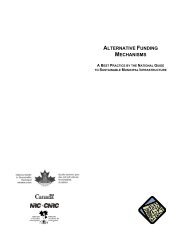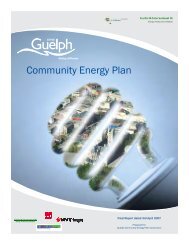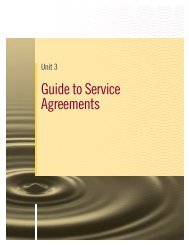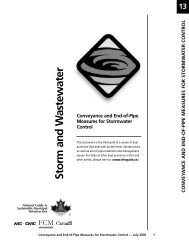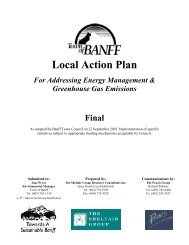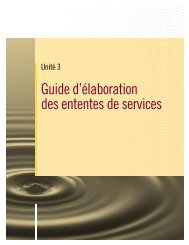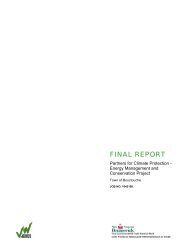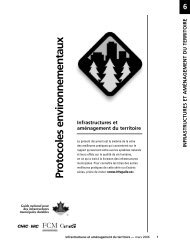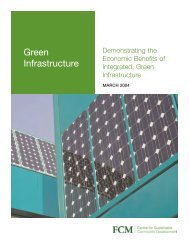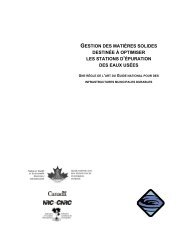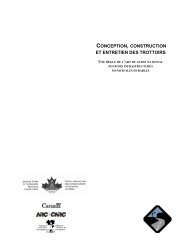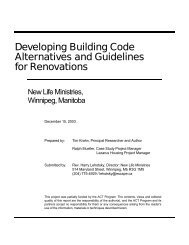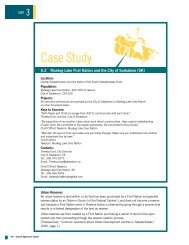The State of Canada's Cities and Communities 2012 - FCM
The State of Canada's Cities and Communities 2012 - FCM
The State of Canada's Cities and Communities 2012 - FCM
Create successful ePaper yourself
Turn your PDF publications into a flip-book with our unique Google optimized e-Paper software.
Chapter 1<br />
Page 6<br />
SIGN TAX<br />
Since 2010, Toronto has levied a Third-Party Sign<br />
Tax. In Winnipeg, the Outdoor Advertising Tax is<br />
levied in lieu <strong>of</strong> the annual Business Tax paid by<br />
all other businesses operating in Winnipeg. <strong>The</strong><br />
Outdoor Advertising Tax in Montréal is a flat rate<br />
per advertising face, favouring large signs over<br />
small ones. <strong>The</strong> City <strong>of</strong> Edmonton imposes an<br />
application fee for erecting a free-st<strong>and</strong>ing business<br />
identification sign for commercial, industrial,<br />
<strong>and</strong> institutional buildings that are located<br />
on city rights <strong>of</strong> way. In addition, it charges a<br />
licencing fee as a percentage <strong>of</strong> market value,<br />
as well as an annual renewal fee.<br />
LOTTERY REVENUES<br />
<strong>The</strong> City <strong>of</strong> Toronto collects revenues from<br />
both the Ontario Lottery <strong>and</strong> Gaming Corporation<br />
(OLG) <strong>and</strong> from charities <strong>and</strong> non-pr<strong>of</strong>it<br />
organizations looking to hold one-time events.<br />
For these one-time events, licences are required.<br />
Additionally, fees (the size <strong>of</strong> which are determined<br />
by the value <strong>of</strong> the prize board) must<br />
be remitted to the City. <strong>The</strong>re is a multi-tiered<br />
revenue-sharing formula for various components<br />
<strong>of</strong> the OLG slots <strong>and</strong> casinos.<br />
LAND TRANSFER TAXES<br />
Municipalities in Quebec levy an amount on<br />
the sale <strong>of</strong> immovable property (new or existing)<br />
within their territory. <strong>The</strong> amount, <strong>of</strong>ficially<br />
known as the “duty” on transfers <strong>of</strong> immovables,<br />
is commonly referred to as the Welcome Tax,<br />
<strong>and</strong> is paid by the purchaser. Toronto levies a<br />
Municipal L<strong>and</strong> Transfer Tax on purchases <strong>of</strong> all<br />
properties in the City <strong>of</strong> Toronto (in addition to<br />
the provincial L<strong>and</strong> Transfer Tax). In Nova Scotia,<br />
municipalities can levy a deed-transfer tax up to<br />
a maximum rate set by the province. Halifax<br />
Regional Municipality levies a deed-transfer tax,<br />
but not all municipalities in Nova Scotia require it.<br />
PARCEL TAX<br />
Municipalities in British Columbia levy a parcel<br />
tax on any designated area <strong>of</strong> l<strong>and</strong> that does not<br />
include a highway. Parcel taxes are <strong>of</strong>ten used<br />
instead <strong>of</strong>, or in conjunction with, user fees to<br />
recover the costs <strong>of</strong> providing local government<br />
services. <strong>The</strong>y can be levied on any property<br />
that could potentially be provided with a service,<br />
regardless <strong>of</strong> whether or not the service is being<br />
used.<br />
HOTEL TAX AND VOLUNTARY<br />
DESTINATION MARKETING FEES<br />
Hotel taxes are levied at the provincial level<br />
across Canada, <strong>and</strong> at the municipal level<br />
in some municipalities in some provinces.<br />
<strong>The</strong>se taxes can be voluntary or involuntary.<br />
In British Columbia, an additional 1 or 2%<br />
municipal <strong>and</strong> regional district tax on lodging<br />
is collected in Chilliwack, North Vancouver,<br />
Oak Bay, Parksville, Prince Rupert, Qualicum<br />
Beach, Richmond, Rossl<strong>and</strong>, Saanich, Smithers,<br />
Surrey, Vancouver, Victoria <strong>and</strong> Whistler.<br />
In Vancouver, 100% <strong>of</strong> these funds go to<br />
Tourism Vancouver. In addition, 1.65% <strong>of</strong><br />
the 8% sales tax on hotels province-wide<br />
is dedicated to funding Tourism BC.<br />
Calgary, Edmonton, <strong>and</strong> Saskatoon levy a<br />
Destination Marketing Fee (DMF) on hotels in<br />
their cities. In Quebec, an additional tax is levied<br />
per room per night in Québec City <strong>and</strong> area, as<br />
well as in the Outaouais, Charlevoix, Saguenay-<br />
Lac-Saint-Jean, Chaudière-Appalaches, Eastern<br />
Townships, Gaspésie <strong>and</strong> Centre-du-Québec.<br />
<strong>The</strong>se revenues are returned to each tourism<br />
association, minus a collection fee.<br />
In Ontario, a number <strong>of</strong> hotels <strong>and</strong> motels charge<br />
a DMF to fund promotional campaigns aimed<br />
at boosting their municipality’s tourism trade.<br />
<strong>The</strong>se fees are not municipally imposed, but are<br />
instead imposed by the hotels/motels on a voluntary<br />
basis. In New Brunswick, an additional fee<br />
on top <strong>of</strong> provincial taxes is charged on rooms<br />
in Bathurst <strong>and</strong> Saint John. Halifax Regional<br />
Municipality has a levy for hotels with more than<br />
20 rooms. Charlottetown charges a supplementary<br />
room tax on top <strong>of</strong> the provincial sales tax.<br />
In St. John’s, there is an additional room tax,<br />
part <strong>of</strong> which is used to fund the Visitors <strong>and</strong><br />
Convention Bureau, <strong>and</strong> part <strong>of</strong> which is applied<br />
towards the debt on the Convention Centre.




